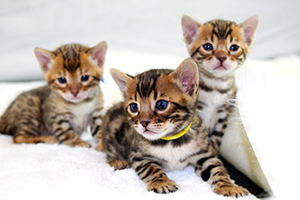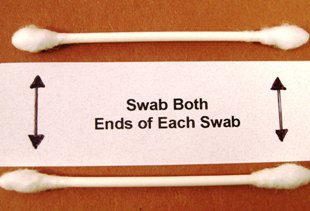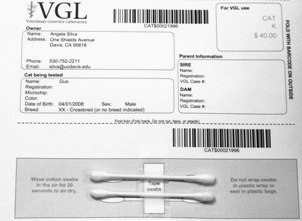Quick Summary
Click here for Price and Turnaround Time
Phenotype: Cats with the severe form of mucopolysaccharidosis VI show signs at 6-8 weeks of age that include wide faces, shortened noses, small ears, reduced flexibility, and retarded growth. By 8 months of age, severe hind-limb mobility issues or paralysis and signs of degenerative joint disease may be observed. Additional effects of the disease include corneal clouding and heart valve thickening. Clinically, urine samples show increased levels of dermatan sulfate (DS) and an increase in white blood cell granules.
Cats with two copies of the mild form disease (MPSVIm) have less 4S enzyme and form granules in the white blood cells but otherwise appear healthy.
Mode of Inheritance: Autosomal recessive
Alleles: N = Normal, MPSVIm = mucopolysaccharidosis VI (mild form), MPSVIs = mucopolysaccharidosis VI (severe form)
Breeds appropriate for testing: Domestic Shorthair, Birman, Oriental Longhair, Oriental Shorthair, Ragdoll, Siamese and related breeds
Explanation of Results:
- Cats with N/N genotype will not have either form of mucopolysaccharidosis VI. They cannot transmit these MPSVI variants to their offspring.
- Cats with N/MPSVIm genotype will not have mucopolysaccharidosis VI, but are carriers of the mild form of the disease. They will transmit this MPSVIm variant to 50% of their offspring. Matings between two carriers of the mild form are predicted to produce 25% kittens affected by the mild form of mucopolysaccharidosis VI.
- Cats with N/MPSVIs genotype will not have mucopolysaccharidosis VI, but are carriers of the severe form of the disease. They will transmit this MPSVIs variant to 50% of their offspring. Matings between two carriers of the severe form are predicted to produce 25% kittens affected by the severe form of mucopolysaccharidosis VI.
- Cats with MPSVIs/MPSVIm genotype will have the mild form of mucopolysaccharidosis VI but may appear healthy. They will transmit this MPSVIm variant to 50% of their offspring and this MPSVIs variant to 50% of their offspring.
- Cats with MPSVIm/MPSVIm genotype will have the mild form of mucopolysaccharidosis VI but may appear healthy. They will transmit this MPSVIm variant to all of their offspring.
- Cats with MPSVIs/MPSVIs genotype will have the severe form of mucopolysaccharidosis VI, a degenerative disease.
Cat DNA tests are carried out using cells brushed from your cat's cheeks and gums using household cotton swabs.
The cat DNA submission form with instructions and a place to tape the cotton swabs is sent to you via email after you place an order, and can be printed from your home computer. DNA test kits are no longer mailed.
Instructions
Step-By-Step:
1.
 Purchase regular household cotton swabs for cat DNA collection (the cotton swabs can be purchased at a pharmacy or drug store)
Purchase regular household cotton swabs for cat DNA collection (the cotton swabs can be purchased at a pharmacy or drug store)
2.

Make sure the cat has not had anything to eat or drink for at least 1 hour prior to collecting sample.
When swabbing kittens, isolate each kitten from the mother, littermates and any shared toys for 1 hour prior to swabbing. Kittens should not have nursed or eaten for 1 hour prior to collecting sample.
If collecting samples from more than one cat, make sure to sample one cat at a time and wash your hands before swabbing another cat.
3.
 Use both ends of the two cotton swabs for a total of four swabs.
Use both ends of the two cotton swabs for a total of four swabs.
4.
Place the cotton head of the swab between the cat’s gums and cheek and rub or rotate the swab back and forth for 15 seconds. Repeat with each cotton swab head, for a total of 4 swabs. We recommend swabbing a different area of the gums with each swab head.
5.
Wave the swab in the air for 10-15 seconds to air dry it before attaching it to the submission form.
6.
 After swabbing the cheek and gums, tape the cotton swabs to the bar-coded submission form printed from your MyVGL account.
After swabbing the cheek and gums, tape the cotton swabs to the bar-coded submission form printed from your MyVGL account.
ATTENTION:
- Do not collect saliva/drool – the key to obtaining a good sample is getting cheek cells on the swab.
- Do not rub swab on the cat’s tongue or teeth – this will result in poor quality sample.
- Do not collect a sample from a kitten that has recently nursed – the mother’s genetic material can rub off on the kitten’s mouth and contaminate the sample.
Mucopolysaccharidosis VI severe (MPSVIs) and mild (MPSVIm) are lysosomal storage diseases resulting from two independent mutations in the gene for enzyme N-acetylgalactosamine 4-sulfatase (4S). Both are inherited as autosomal recessives, thus males and females can be equally affected if they carry 2 copies of the defective gene. Cats with 2 copies of the severe form show signs at 6-8 weeks of age that include wide faces, shortened noses, small ears, reduced flexibility, and retarded growth compared to unaffected littermates. By 8 months of age, problems of severe hind-limb mobility or paralysis, and signs of degenerative joint disease can be observed. Clinically, urine samples show increased levels of dermatan sulfate (DS) and an increase in white blood cell granules. Organs and tissues can also be compromised by accumulation of intercellular DS. Additional effects of the disease include corneal clouding and heart valve thickening.
Cats with two copies of the mild form disease (MPSVIm) have less 4S enzyme and form granules in the white blood cells but otherwise appear healthy. The same is true of cats with one copy of the mild form and one copy of the severe form. Cats with only one copy (carrier) of either mutation and one copy of the normal gene appear healthy. Breeding two carriers together is predicted to produce 25% affected offspring and 50% carriers of the disease.
Testing for MPSVIs and MPSVIm assists owners and breeders in identifying affected and carrier cats.
